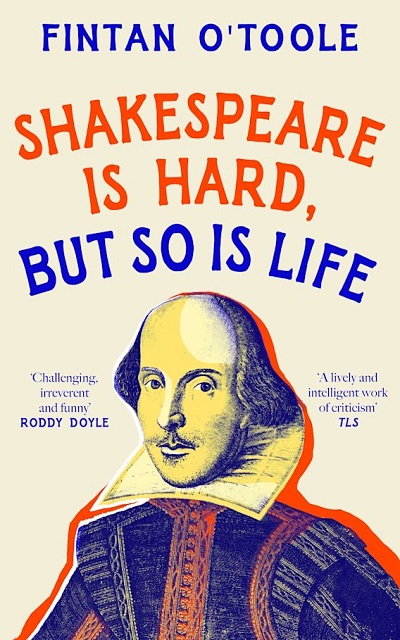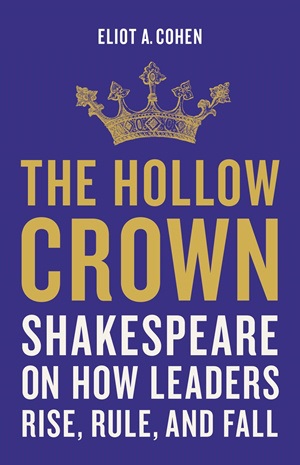Surely every serious reader agrees with Hamlet, that Shakespeare’s plays hold “a mirror up to nature”, thus revealing “the very age and body” of us and our times. Although Fintan O’Toole and Eliot Cohen are both certainly persuaded about Shakespeare as a mirror, their recent books act as point and counterpoint, using disparate perspectives to draw quite distinct conclusions.
Fintan O’Toole, best known for a history of modern Ireland (We Don’t Know Ourselves), has a gift for combining a quizzical mind with a quirky phrase. Having analysed the one period in Irish history that was not tragic, O’Toole has turned his attention to four of Shakespeare’s tragedies in Shakespeare is Hard, but So is Life. His essential judgment is that the plays comprise “a fairground wall of death in which the characters are being pushed outwards by the centrifugal force of the action but held in place by the friction of the language”.
For O’Toole, the characters of Hamlet, Othello, Macbeth and Lear are neither afflicted with a “fatal flaw” nor inevitably doomed. What we experience with and through those characters is contingent and irrational; none possesses “the power to say what will happen next”. None understands himself any better at the end than in Act 1. For the audience as for the heroes, “stepping stones turn out to be trip hazards”.

O’Toole sometimes pushes his case too far, whether in his pre-occupation with rebutting Victorian notions of the plays or his insistence that feudalism and modernity collided in Shakespeare’s life and work. Appraising dramas, he occasionally stretches for a dramatic effect. More often, though, the grace, wit and force of his language lift any otherwise tedious argument. Hamlet, for instance, “talks of suicide like a connoisseur judging a good painting”.
O’Toole mocks those tempted to treat Shakespeare as “a sort of mental muesli that cleans out the system”. For his part, he can be alarmingly brusque with the Bard. “Is Othello stupid?” opens one chapter, while another begins by observing that “the witches in Macbeth are an embarrassment”.
Irony and iconoclasm are easily excused, for Shakespeare’s wonders are renewed for every new reader. Yet another biography of Shakespeare might have seemed superfluous until Stephen Greenblatt published Will in the World. Still one more portrayal of Falstaff might have seemed redundant until Ian McKellen recently inhabited the part in Player Kings. Even Boris Johnson thinks he has something new to say about Shakespeare.
In sharp contrast with O’Toole, Eliot Cohen believes that there exist “few guides as perceptive as Shakespeare”, including for instructions “on how leaders rise, rule and fall”. Not only has Cohen taught a course on Shakespeare for policymakers. He notes that reading the plays (here, Richard III) “even nudged me into anticipating a major war”.
The premise of The Hollow Crown is therefore that a playwright who worked more than half a millennium ago, who never occupied any leadership position within his State, who could know nothing of our world, can nonetheless serve as the source of specific, practical guidance for our own leaders. Nobody appears to have devised courses for policymakers on the Gospels, the Mahabarata, or the thoughts of Abraham Lincoln.

Cohen, however, has propounded Shakespearean models and morals for the exercise of power (by inspiration, manipulation or crime), then for its loss (through arrogance, self-deception or voluntary relinquishment). That approach might seem a bit schematic or reductive. Everything depends on how deeply and wisely the plays have been read.
There Cohen proves himself an astute, serious reader. Some of his parallels between Shakespearean characters and real-life heroes are suggestive, even if others seem stretched. A declaration that “if Octavian is Stalin, Antony is Trotsky” is offset by allusive links between Henry IV and Bill Slim, Macbeth and African leaders, Prospero and Obama. Zelenskyy’s public relations and Thatcher’s fall are treated with particular insight. Stagecraft meets statecraft. Or, in Cohen’s judgment, “power is almost always exercised through a kind of theatre”.
Cohen does not crudely identify characters out of plays with leaders in politics. He offers links, cross-references, echoes and convergences. He presents morals where O’Toole showed a whirligig. As for morals and whirligigs, imagine if Shakespeare were alive now and commissioned to write another series of history plays, this series set in Washington rather than London, with the sequence beginning with John Kennedy and running up to Donald Trump. Those plays would include both deep tragedy and rich farce, hubris and nemesis, book-ended by the fatefully misjudged decisions to fight in Vietnam and Iraq.
Both O’Toole and Cohen scrutinise motives and intentions, tradecraft as well as stagecraft. If neither of them quite captures Shakespeare, that might be because “neither wit nor words nor worth” (Shakespeare’s Antony) can really do so.
Shakespeare is Hard, but So is Life, by Fintan O’Toole (Head of Zeus, 2024)
The Hollow Crown: Shakespeare on How Leaders Rise, Rule, and Fall, by Eliot Cohen (Basic Books, 2024)

